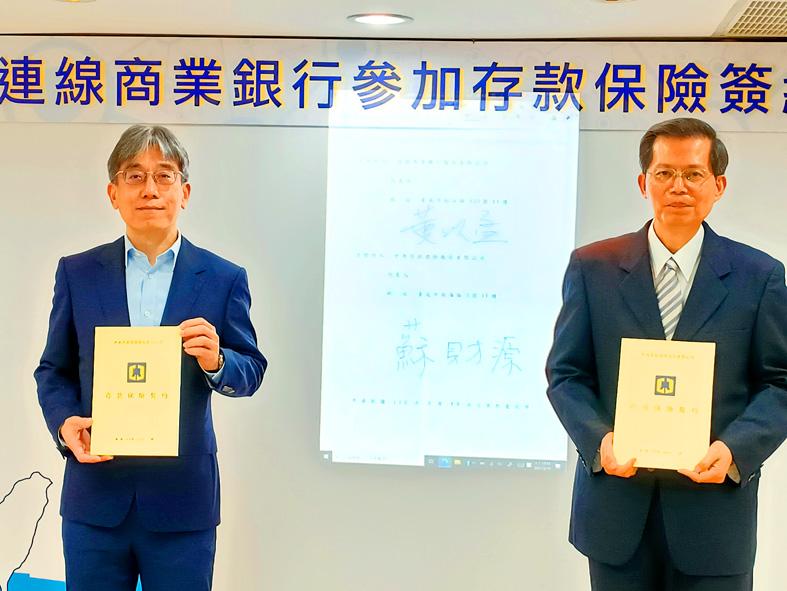Line Bank Taiwan Ltd (連線商業銀行), the second Internet-only bank in the nation, is to begin trial operations on Wednesday, before an official launch next month, Line Bank general manager Morris Huang (黃以孟) said on Friday.
The bank has completed several rounds of tests, such as stress tests, integration tests and user tests, and the bank is well-prepared to open to the public, Huang said.
The bank also signed an agreement with Central Deposit Insurance Corp (CDIC, 中央存保) to provide deposit insurance to its clients.

Photo: Lee Chin-hui, Taipei Times
Huang said that 700 employees of the three Taiwanese subsidiaries of Line Corp would be offered services in the trial.
As a Web-only bank, it has placed much emphasis on cybersecurity, Huang said.
The bank would initially offer debit card services and personal loans, but more preparations would be needed before credit card services could be offered, he said.
Once it offers services to the public, the bank would start with a promotion campaign, but it would not initially engage in price competition to achieve a certain market share, Huang said.
Line Financial Taiwan Corp (台灣連線金融科技), which owns 49.9 percent of Line Bank, last quarter started a similar Internet-only bank in Thailand — Line Bk — which has been faring as expected, Huang said.
The Thai bank’s performance would serve as a benchmark for the Taiwanese operations, he said.
Rakuten International Commercial Bank Co (樂天國際商銀), Taiwan’s first Web-only bank, opened in January, while Next Bank (將來銀行) is expected to become the third, as its application to begin operations is under review at the Financial Supervisory Commission.

SELL-OFF: Investors expect tariff-driven volatility as the local boarse reopens today, while analysts say government support and solid fundamentals would steady sentiment Local investors are bracing for a sharp market downturn today as the nation’s financial markets resume trading following a two-day closure for national holidays before the weekend, with sentiment rattled by US President Donald Trump’s sweeping tariff announcement. Trump’s unveiling of new “reciprocal tariffs” on Wednesday triggered a sell-off in global markets, with the FTSE Taiwan Index Futures — a benchmark for Taiwanese equities traded in Singapore — tumbling 9.2 percent over the past two sessions. Meanwhile, the American depositary receipts (ADRs) of Taiwan Semiconductor Manufacturing Co (TSMC, 台積電), the most heavily weighted stock on the TAIEX, plunged 13.8 percent in

A wave of stop-loss selling and panic selling hit Taiwan's stock market at its opening today, with the weighted index plunging 2,086 points — a drop of more than 9.7 percent — marking the largest intraday point and percentage loss on record. The index bottomed out at 19,212.02, while futures were locked limit-down, with more than 1,000 stocks hitting their daily drop limit. Three heavyweight stocks — Taiwan Semiconductor Manufacturing Co (TSMC, 台積電), Hon Hai Precision Industry Co (Foxconn, 鴻海精密) and MediaTek (聯發科) — hit their limit-down prices as soon as the market opened, falling to NT$848 (US$25.54), NT$138.5 and NT$1,295 respectively. TSMC's

TARIFFS: The global ‘panic atmosphere remains strong,’ and foreign investors have continued to sell their holdings since the start of the year, the Ministry of Finance said The government yesterday authorized the activation of its NT$500 billion (US$15.15 billion) National Stabilization Fund (NSF) to prop up the local stock market after two days of sharp falls in reaction to US President Donald Trump’s new import tariffs. The Ministry of Finance said in a statement after the market close that the steering committee of the fund had been given the go-ahead to intervene in the market to bolster Taiwanese shares in a time of crisis. The fund has been authorized to use its assets “to carry out market stabilization tasks as appropriate to maintain the stability of Taiwan’s

In a small town in Paraguay, a showdown is brewing between traditional producers of yerba mate, a bitter herbal tea popular across South America, and miners of a shinier treasure: gold. A rush for the precious metal is pitting mate growers and indigenous groups against the expanding operations of small-scale miners who, until recently, were their neighbors, not nemeses. “They [the miners] have destroyed everything... The canals, springs, swamps,” said Vidal Britez, president of the Yerba Mate Producers’ Association of the town of Paso Yobai, about 210km east of capital Asuncion. “You can see the pollution from the dead fish.